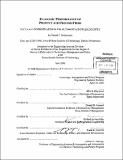Economic performance of product and process firms
Author(s)
Steinemann, Patrick P. (Patrick Paul), 1969-
DownloadFull printable version (9.724Mb)
Other Contributors
Massachusetts Institute of Technology. Engineering Systems Division.
Advisor
John B. Heywood.
Terms of use
Metadata
Show full item recordAbstract
This dissertation refines the understanding of economic performance of firms, using data and practical insights from the automotive supplier industry. Firms in this industry are characterized as either product or process firms, reflecting the importance of technological capabilities in manufacturing industries. Specialized capabilities in product markets define product firms, whereas capabilities in materials processing and manufacturing technologies define process firms. A measure of technological coherence is introduced, which expresses the relatedness of capabilities of a firm. The measure is based on a concentration index and a hierarchical classification of products and processes in the automotive supplier industry. Using this measure of coherence, analysis shows that firms with stronger coherence are able to better exploit corporate synergies and therefore achieve superior economic performance. That is, firms focusing on a specialized and related set of capabilities are able to outperform less coherent firms. Analysis further reveals a significant difference in performance between product and process firms. Product firms in the automotive supplier industry exhibit negative returns to scale, whereas process firms exhibit positive returns to scale. These differences are attributed to the underlying corporate logic of product and process firms, supported with studies of value creation in corporate acquisitions and interviews with corporate executives. The findings have implications for strategic choices of firms, such as choosing between product and process focus, and choosing between focus and diversification. The dissertation contributes to strategic management theory with a framework of product and process firms that is based on a technological view of the firm, and with a measure of technological coherence that facilitates empirical research of corporate coherence.
Description
Thesis (Ph.D.)--Massachusetts Institute of Technology, Engineering Systems Division, 2000. Includes bibliographical references (leaves 169-175).
Date issued
2000Department
Massachusetts Institute of Technology. Engineering Systems DivisionPublisher
Massachusetts Institute of Technology
Keywords
Engineering Systems Division.